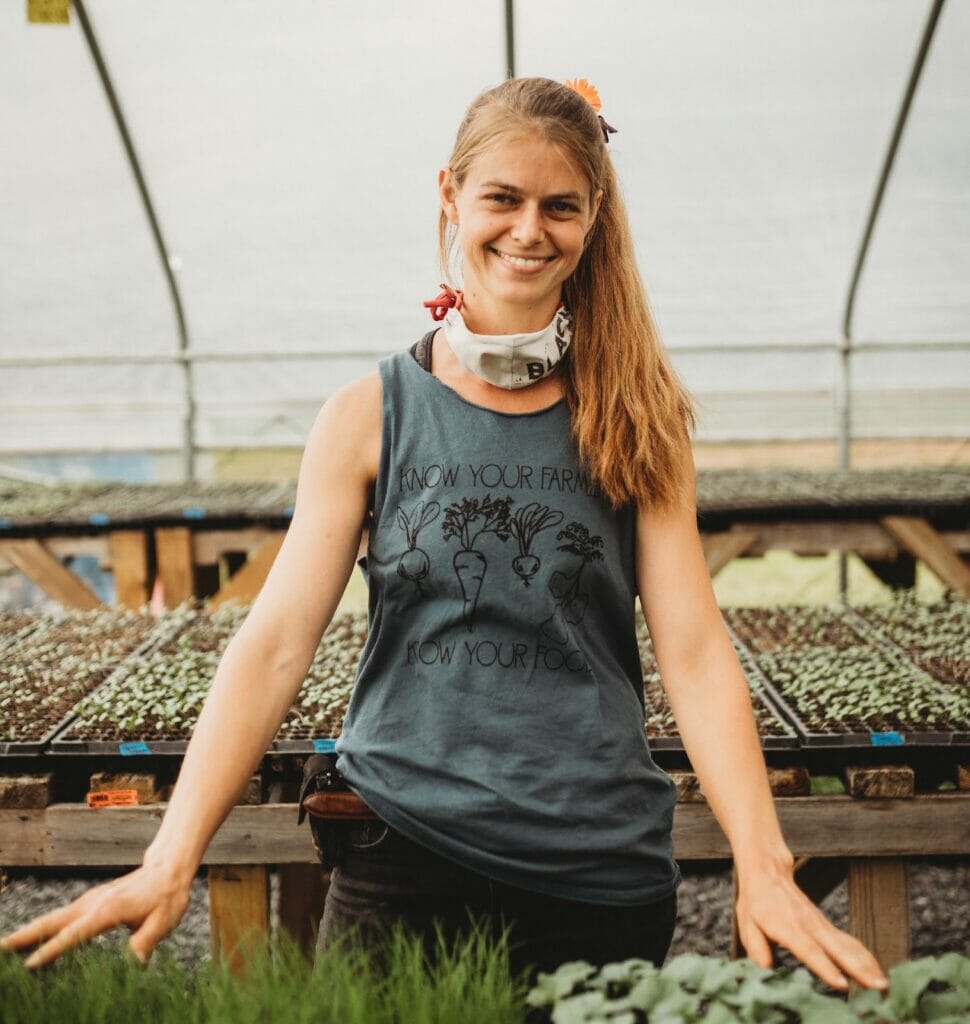The pandemic has elevated local farms as trusted resources for aspiring growers.

Each time Emma Jagoz plants a seed on her pasture, she revels in the anticipation of new connections and conversations her locally grown produce will inspire come harvest time.
“People know that we are here for them, to answer their burning questions and to support them with healthy, fresh, organic, regional food, ” says Jagoz, who owns and operates Moon Valley Farm in Frederick, Maryland. “It’s been an honor to be a resource and a piece of the local food movement.”
Jagoz has felt her role as a small farmer grow into something even more substantial since the pandemic triggered a gardening renaissance and greater appreciation for growing food locally. In addition to producing food, Jagoz and other small farmers started teaching many others how to grow their own.
Last year, amid the panic buying and backed up seed market, Jagoz started a seedling delivery program called Plant Yourself. To date, it has delivered several thousand orders to customers in Baltimore and Washington, DC. As part of the program, she launched a newsletter to share growing tips and recipes for seasonal crops. She also started Instagram and Facebook pages under the name “Garden like a Farmer,” as an additional avenue to outsource her knowledge.
She says she’s brought in more than double the amount of sales she would normally bring in from selling seedlings, which significantly helped offset sales she lost from restaurant closures. And this year, she hosted an inaugural potted plant sale that nearly sold out. She plans to host another in a few months for cold weather crops.
Despite Jagoz’s unique initiatives that place a larger focus on aspiring growers, the situation at Moon Valley Farm is not a one-off. Throughout the pandemic, small, local farms across the country have not only pivoted or expanded their business models into the gardening realm, they’ve increasingly become a trusted source of knowledge for those planting fruits and vegetables in their own home.
Agricultural economists say this evolution of the local farm is one widespread trend that is likely here to stay. Ariana Torres, an assistant professor at Purdue University’s department of agricultural economics, says even prior to the pandemic, tendencies to buy from smaller community producers and a yearning to understand where food comes from were on the rise. The pandemic, she adds, just accelerated this phenomenon and growing food at home is an extension of that.
“There’s a big opportunity for farmers who are local to share the knowledge and translate those relationships in local markets into plant or seedling sales,” she says. “What we have here is like a social movement, especially amongst younger generations interested in understanding the impact of their food choices. But farmers need to recognize this and understand how they can offer and present something that appeals to different demographics.”
Torres says there are many reasons why smaller farms are best positioned to take advantage of these trends. First, they have direct access to customers, which allows them to understand the specific demands in their area. The size of their operations also offers flexibility to adapt to those needs. And because they grow food for a living locally, Torres says people are more likely to trust their product and gardening know-how over a box store or more corporate entity.
In Des Moines, Iowa, Jenny Quiner of Dogpatch Urban Gardens says she’s certainly felt more people in her community flock to her farm and contact her for her expertise since pandemic gardening has taken off. Early on in the pandemic, Quiner was consumed with transitioning to an online store, but had plans to eventually tap into the local crop of new gardeners.
Last month, she partnered with a local greenhouse to host a plant pop-up sale where she sold ready-to-pot plants, seedlings and basic gardening tools. The event, she says, provided her with additional revenue ahead of the initial growing season and roughly 50 percent of her monthly sales came from plant purchases.
“I know that my farm can be a huge resource to my community,” she says. “Because a lot of people who support local farmers have an interest in food and a desire to have their hands in the soil, to me, it feels like a natural progression for us to be part of their gardening journey.”
Quiner says she plans to host more plant pop-ups in the future. She’s been researching how she can heat her high tunnels to start her growing season earlier to make more room for seedlings and various garden plants. When she lands on a solution, it could result in employing staff months in advance, as early as February—something that is largely unheard of given that the ground is still frozen in Iowa. Ultimately, it’s an opportunity to involve more of her community in the local food economy.
Jagoz, similarly, feels the time is right to be a small farmer. If focusing on gardeners will not only help her business thrive, but also mobilize self-sufficient, local food conscious Americans, she’s more than happy to do so.